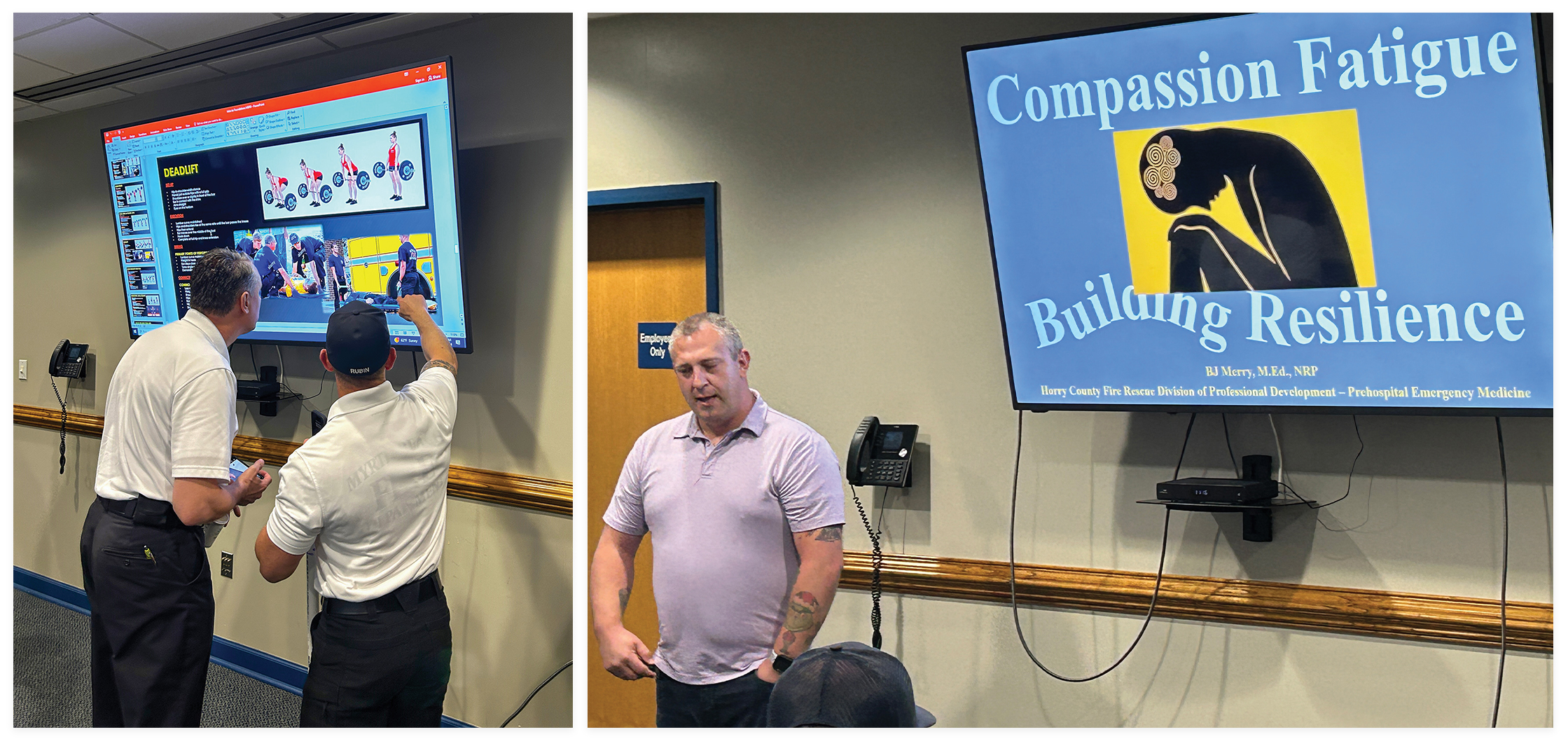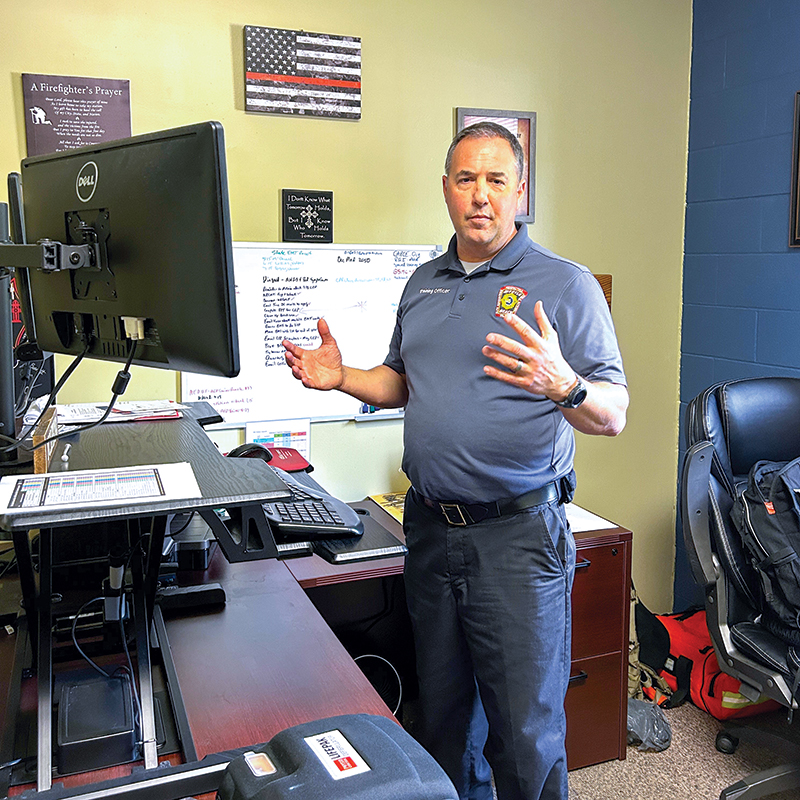A Day in the Life of Dwayne Wright

It’s too easy for most of us to take for granted our nurses, law enforcement officers, EMTs and firefighters; they are out of sight, out of mind…until we need them. The long, hard hours they work and the often less than compensatory wages they receive should make their sacrifices that much more appreciated, but do they really? Or do we just go on with our days, complaining about taxes, oblivious, until it’s time to make that 911 call, or someone makes that call on our behalf? This dedication to service comes at a cost to these first responders, but the Myrtle Beach Fire Department has a plan, and works to relieve and prevent the sometimes-deadly illnesses and stresses caused by such occupations.
When I first met Myrtle Beach firefighter Captain Dwayne Wright many months ago, he was with his family and a mutual friend, sharing pizza at a local Carolina Forest haunt. He had been introduced simply as “Dwayne,” and he seemed like an all-around average Joe, a family man who liked to kid, had a ready smile, but was on the quiet side. It wasn’t until a later conversation with this same mutual friend I found out who Dwayne really was and how he’d spent the past nearly three decades of his life in service to the citizens of Myrtle Beach, and for the past almost four years as a department Training Captain.
In preparing for any Day In The Life Feature, I find myself thinking about people I know (or know of) who hold interesting and unusual jobs, working and living in the greater Grand Strand area, and I sometimes struggle with the task. When it came time to put this issue’s story together, I knew just who to call. We set up a meeting and I was able to get a taste of Captain Wright’s day and the important work the entire team does, day-in and day-out, fighting flames, saving lives and bringing calm to chaos.
8:54 a.m. Myrtle Beach Fire Station #6
We meet in the hallway of Fire Station #6 on 38th Ave. North in Myrtle Beach as a class of MBFD personnel (firefighter/EMTs) are milling around the kitchen. Brittain Resorts donated breakfast for the class and the group of 25 or so men (no women, at least in this class), are preparing for a three-hour training session. The men range from 18 years old to 60-something and work a straight 24-hour shift, followed by 48-hours off, repeating the schedule over and over. They are young, older, tall, short, big, and small, and ready to hear what Captain Wright and two guest speakers have in store for them.

Firefighters are required to be certified in a huge number of disciplines, including EMT Basic and Firefighter, but just as important, and often overlooked, they are now regularly tasked with learning how take care of themselves, the focus of the day’s training. Like the U.S. military, firefighters and the EMS are more-or-less a paramilitary organization, and as such, they love their acronyms.
“Today we’re teaching E.M.S. in our C.E.P.,” he tells me, which translates to Emergency Medical Service taking required, ongoing Continuing Educational Programs. “My job is to teach the different curricula and to make sure they get their hours in,” he continues. “We’re dual certified to conduct National Registry certification and State certification.”
Wright is a lifelong native of the area, graduated from Myrtle Beach High School, and started on the force in 1998. He is one of two Training Captains and works under a Battalion Chief. The MBFD employs some 180 full-time personnel, with 150 firefighter/EMTs on the street, answering calls. There are around 10 women currently in the firefighting ranks in Myrtle Beach, a few more than the national average for similarly sized departments.
This day’s training is broken up into a three-hour block, with breaks.
“I’ll teach in the first hour,” says Wright, “on Cancer Awareness and Mental Health Awareness, and then Tadd Rubin, a Myrtle Beach Police Ocean Rescue Lieutenant, will speak on physical fitness in the second hour. It’s all about how to work out, why to work out, target heart rates, that kind of thing, and then the final hour we have a visiting Horry County EMS training officer “BJ” Merry, who’s amazing, teaching about Compassion Fatigue. Next week he’s moving to Wyoming to become an EMS Director. He speaks at national symposiums, and he’s really awesome.”
The focus on mental health and stress is a bit of surprise, as the subject matter is all but taboo in much of society, let alone the rough-and-tumble world of EMS and Firefighting, yet here these men were seated, attentive and ready to learn. Surely some of them would have preferred to keep the mental health topic buried, but the requirement to take the courses ensures that everyone hears the message, whether they want to or not. As Captain Wright would later point out, a firefighter may look fine, feel fine, and think he/she is managing well, only to have a “stress bomb” hit out of nowhere and cause real issues. The after-effect of the potential and realized trauma that these workers face every day is nothing short of PTSD. Firefighters and EMTs are far more likely to succumb to suicide than the general population. The suicide rate among law enforcement is even higher. According to Wright and the MBFD Health and Wellness Committee, C.E.P. is not only required, it’s vital to a firefighter/EMT’s health and survival, and for the safe and efficient operation of the department.
9:05 a.m.
After a few brief announcements and explanations of the day’s programs, Captain Wright and his Power Point slides on the big screen are off and running. He starts with some startling statistics that have to be hard to hear.
“I don’t want this day to be doom-and-gloom,” he says, “but I’m a person who benefits from the resources of the city and enlightenment on this topic. To know about the resources available, will be extremely helpful.”
He goes on to cite sources estimating that firefighters have a nine percent higher risk of a cancer diagnosis and are 14 percent more likely to die from cancer then the general population. Cancer is the leading cause of death among firefighters, with esophageal cancer 62 percent higher than the general population. This simple awareness alone is one of the myriad issues potentially causing stress.
“Yeah, I got stress,” laughs Wright. “I have a 14-year-old, a 17-year-old and a 20-year-old that just moved back in and brought her 14-week-old puppy.” The guys chuckle and smile, appreciating the levity surrounding an otherwise difficult topic.
Wright shares more frightening data along with plenty of how-to instruction and cleaning techniques for gear returned from a fire, the source of countless carcinogenic compounds. He discusses the importance of proper masking, and other tactics proven to reduce risk.

Wright and other fellow trainers teach these courses at various fire stations around the city to make sure personnel are up to date on their certifications, but more importantly to help ensure their wellbeing.
“When I’m not teaching, I’m at my office working on curriculum, scheduling, helping someone who missed a class take a make-up class…it’s ongoing.” Wright is also a fully qualified paramedic who occasionally will go out on calls, but with a staff position, Wright’s work primarily consists of his training duties. “I’ve got a radio, a truck with lights on it, so I can go on any calls I need to,” he notes.
11:01 a.m.
After introducing Officer Merry, Wright takes a seat in the back of the class with other officers of the MBFD. The program has proven so popular in recent incarnations, according to Wright, that some of the chiefs at the highest ranks in the MBFD will sit in on the day’s lecture.
Officer Merry indicates he is a lifelong resident of Horry County joining the fire department before he graduated high school.

“I’ve known nothing but this profession my entire life,” he says. “I’m married to my best friend, and she puts up with me, thank God, because I wouldn’t be able to get through the stresses of this job without her…and we have five children. Why is this important? Because it’s what happens in this job and outside this job that eats us up. We always say we’re ‘livin’ the dream,’ but nightmares can be dreams, too.’”
He goes on to discuss “Compassion Fatigue,” a term that first came to light in the early 1990s relating to feelings of anger, helplessness, or even worse, no emotion at all, from trauma nurses. First responders quickly realized that this is an issue affecting many in a variety of fields. Witnessing tragedies, fighting fires, being first on the scene at automobile accidents, responding to 911 calls—this work is tremendously hard on a person emotionally and physically.
Merry went to say that the old way of dealing with stress or compassion fatigue “don’t talk about it, don’t think about it,” is being replaced by an arsenal of information and steps that each first responder can take.
“Recognizing the signs and being unashamed to admit you need help,” added Wright, “peer-to-peer discussions, calling a friend or mentor, or seeking professional help is vital to keeping compassion fatigue and other stressors at bay.” Therapy and medical intervention for firefighters/EMTs is provided through the City of Myrtle Beach health insurance plans.
The City of Myrtle Beach is not currently hiring for the MBFD (as of press time), but recruitment will take place in the future, as the city grows, and the needs increase. Next time you hear a siren, pass a fire station, or see first responders in action, don’t forget that they are not superhuman, just superheroes.